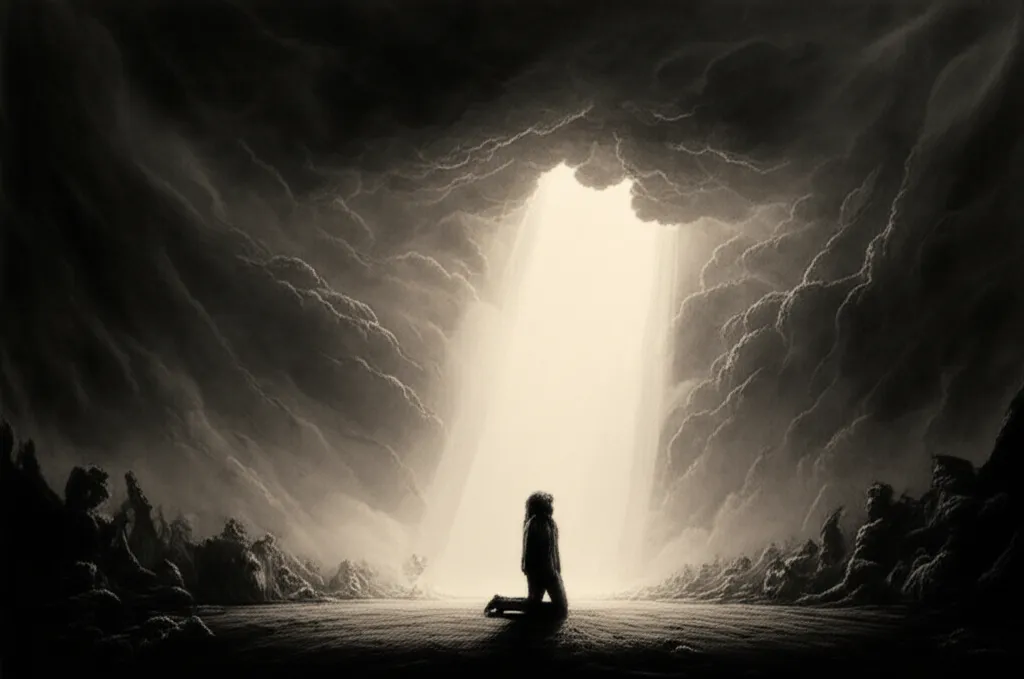In the tapestry of our daily lives, threads of joy and sorrow, hope and despair, are interwoven. Today's readings offer a profound reflection on God's unwavering presence amidst these complexities, reminding us that even in our darkest moments, we are not forsaken. They challenge us to examine our own responses to suffering, both our own and that of others, and to recognize the divine hand that guides and sustains us.
God Hears the Cry of the Afflicted
The first reading from Genesis (21:5, 8-20a) recounts the poignant story of Hagar and Ishmael, cast out into the wilderness. Abandoned and facing certain death, Hagar's despair is palpable. Yet, in her moment of utter helplessness, "God heard the boy's cry" (Genesis 21:17). This passage is a powerful testament to God's attentiveness to the marginalized and forgotten. It reminds us that no matter how dire our circumstances, God's ear is always inclined to the cry of the afflicted.
The Responsorial Psalm (Psalm 34:7-8, 10-11, 12-13) echoes this sentiment, proclaiming, "The Lord hears the cry of the poor." It assures us that those who fear the Lord lack no good thing, and that the angel of the Lord encamps around those who seek refuge in Him. This is not a promise of a life free from hardship, but rather an assurance of God's presence and provision in the midst of it. It calls us to cultivate a "fear of the Lord," not in the sense of terror, but in the sense of reverence, trust, and obedience.
We are reminded that true faith is not merely intellectual assent, but a lived experience of trust and reliance on God's providence. It is about recognizing that material wealth and earthly power are fleeting, while the love and mercy of God endure forever.
Confronting the Demonic Within and Without
The Gospel reading from Matthew (8:28-34) presents a stark contrast: Jesus' encounter with two demoniacs in the territory of the Gadarenes. These men, living among the tombs, were so savage that no one could pass by. Their encounter with Jesus is a confrontation with divine power, a moment of truth that exposes the darkness within them. The demons recognize Jesus as the "Son of God" and plead not to be tormented before the appointed time.
This passage speaks to the reality of evil in the world, both in its external manifestations and in the internal struggles we face. The demons' desire to inhabit the swine and the subsequent destruction of the herd can be interpreted as a symbol of the destructive nature of sin and the chaos it unleashes. It also highlights the power of Christ to overcome even the most formidable forces of darkness.
However, the reaction of the townspeople is perhaps the most unsettling aspect of this story. Rather than rejoicing in the liberation of the demoniacs, they begged Jesus to leave their district. Why? Perhaps they were afraid of his power, or perhaps they were more concerned with their economic losses (the destruction of the swine) than with the well-being of their neighbors.
This reaction serves as a mirror, reflecting our own tendencies to prioritize comfort and security over the demands of the Gospel. How often do we turn away from those who challenge our worldview or disrupt our comfortable routines? How often do we choose to ignore the suffering of others because it is too difficult or inconvenient to confront?
A Call to Embrace the Uncomfortable
These readings, taken together, present a challenging yet ultimately hopeful message. They remind us that God is present in the midst of suffering, that He hears the cry of the afflicted, and that He has the power to overcome even the darkest forces of evil. However, they also call us to examine our own hearts, to confront our own fears and prejudices, and to embrace the uncomfortable demands of the Gospel.
We are called to be like Christ, who did not shy away from the marginalized and the outcast, but rather sought them out and offered them healing and hope. This requires a willingness to step outside of our comfort zones, to challenge the status quo, and to advocate for justice and compassion.
The early Church understood this call to radical discipleship. They were known for their unwavering commitment to the poor, the sick, and the oppressed. They understood that true faith is not merely a matter of personal piety, but a transformative force that compels us to act on behalf of others. They understood that the Church is not a building, but a community of believers united in love and service.
Let us, therefore, strive to live out our faith with sincerity and conviction, embracing the challenges and opportunities that come our way. Let us be a beacon of hope in a world filled with darkness, a voice for the voiceless, and a source of comfort for those who are suffering. For in doing so, we will not only be fulfilling the will of God, but also discovering the true meaning and purpose of our lives.
